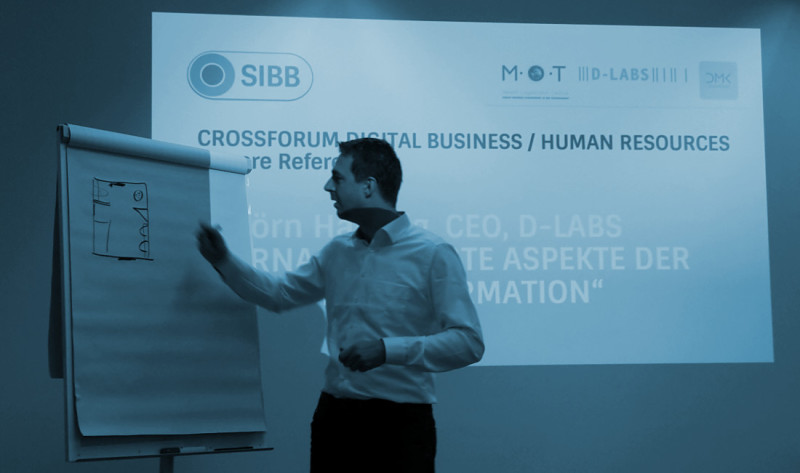Neglected Aspects of the Agile Transformation

Speech held by Jörn Hartwig at the event “Human Resource and Management in the agile environment – experiences and tensions” hosted by the SIBB Forum Digital Business and the Forum Human Resources.
When the question is raised, what “agile” means, answers can be very different, depending on the respective environment. For large enterprises with conventional hierarchical structures it is typically hard to establish agile concepts successfully. Likewise, a project manager at a large enterprise told me “Agile at our company means, that the boss may change everything in the project in every point in time”. This definition of “agile” seems slightly not what was intended by the underlying concept. Real agile projects combine high flexibility with purposefully build-up steps.
In conventional development, applying the waterfall model, plans and goals stay static for a long time. Tender specification and a performance specification are developed extensively and in detail. In several steps the projects is developed for a long time towards the previously set goal. On the other hand, in agile development the extensive planning is replaced by constant planning accompanying every step. Agile development operates in incremental cycles, in which the direction of the development is constantly aligned per experiences made. In every iteration, the development goal is adjusted accordingly.
But what does this mean for organizations in an agile environment? I would like to introduce an example: We build our house along agile principles. Apart from basic decisions like the floor plan everything was developed agile. But at one point a misunderstanding occurred. In the bathroom, the position of toilette and shower had been exchanged at some point. The electrician was meant to install the power socket as far as possible from the shower. But due to the switch the outlet came to sit directly in the shower. The vital concept of communication in the project team was missing. In conventional projects, all decisions are made top-down by the team leader. Agile projects follow a different concept, and therefore inderaction between the team members is of vital importance. Even more important is for all team members to understand the necessity of this communication.
Another example I found at a big software development company. At this company, all employees where required to attend a Design Thinking training. This generated a quite astonishing side effect: The training improved communication and collaboration in the company significantly. Employees from different departments got to know and came to appreciate each other during of the interdisciplinary assembled training groups. Thus, new structures emerged, which bypass established processes, by directly calling an acquainted expert in another department for an opinion. This informal communication channels counteracted the silo mentality and have lead towards a more agile way of working.
In general, I recommend to maintain existing know how when taking the step towards agile development – but to enhance it an agile way. This happens by communication. The empathy of the team members is very important. One knows, and appreciates each other and values the respective qualification of the other team member. Under this condition a real bidirectional communication can be established. Communication is the key for the agile transformation.
About Jörn Hartwig
Jörn Hartwig is CEO and co-founder of D-LABS GmbH in Potsdam. He studied software systems engineering at the Hasso Plattner Institut in Potsdam and software information engineering at the technical university Vienna. Before he started D-LABS, he had worked at numerous national and international companies, including eBay, SAP, Siemens und Texas Instruments.
Contact
14482 Potsdam
potsdam@d-labs.com
10245 Berlin
berlin@d-labs.com
70173 Stuttgart
stuttgart@d-labs.com
